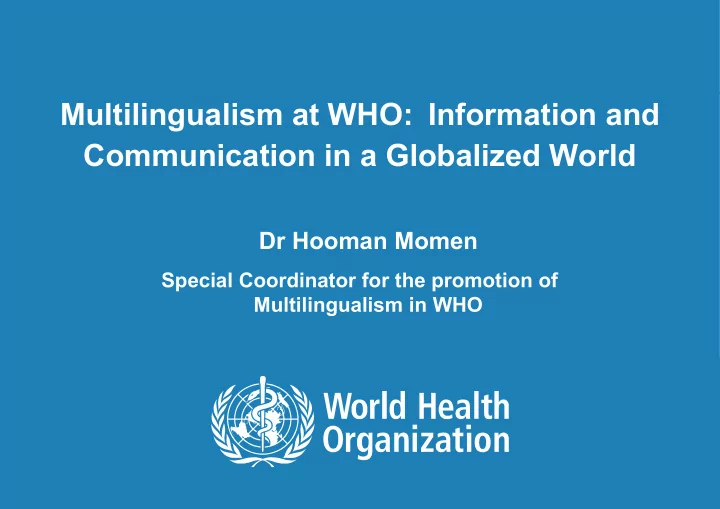

Multilingualism at WHO: Information and Communication in a Globalized World Dr Hooman Momen Special Coordinator for the promotion of Multilingualism in WHO 1 | Multilingualism at WHO | May 7, 2012
WHO Official languages Headquarters: Arabic, Chinese, English, French, Russian, and Spanish AFRO: English, French and Portuguese AMRO/PAHO: English, French, Portuguese and Spanish EMRO: Arabic, English and French EURO: English, French, German and Russian SEARO: English WPRO: Chinese, English and French *** Governing body documentation and interpretation provided in all 6 official languages since 1978 2 | Multilingualism at WHO | May 7, 2012
Multilingualism at WHO Plan of action on multilingualism: EB 121/6, May 2007 "A multilingual WHO is better equipped to communicate health messages, to produce and disseminate health information and to generate, share and use knowledge about health in an equitable manner. It is also better placed to meet today's major public health challenge: strengthening health systems to in order to provide essential health care for all." 3 | Multilingualism at WHO | May 7, 2012
WHO Multilingual Web site All essential content is available in the six official languages Technical content is deliberately published only in some languages – Rationalizing the use of resources Decisions on what content to publish in which language(s) based on – an analysis of the target audience needs – response to emergency situations and crises – Priority of content for the different languages based on 3 factors • the web site traffic statistics of the six language groups • direct feedback and comments from web users • the current thematic priorities of the Organization (e.g. theme of the World Health Report). 4 | Multilingualism at WHO | May 7, 2012
Web pages on WHO web-site Arabic: 5,345 The ranking of the Spanish site in Google is the same Chinese: 5,588 as the English site (9/10). French: 10,272 The other languages are (8/10) Russian: 5,760 New domain name Spanish: 7,664 registered to strengthen language identity In total: 34,629 www.oms.org. English: 46,780 5 | Multilingualism at WHO | May 7, 2012
“Multilingualism and WHO: speaking health in the world’s languages” Exhibition on multilingualism – Launched May 2011, in the presence of the Director-General. – Featured a series of 17 posters about multilingualism • including famous quotes about language, spotlights on countries, language facts and figures, and a collage of one of WHO’s most multilingual titles. – A display of WHO publications in many languages – A quiz to guess the language of 16 different WHO publications. • also made available to the public via the WHO Facebook page. – A presentation ran continuously on the library video screen • Included testimonials from the end-users of WHO’s multilingual information. 6 | Multilingualism at WHO | May 7, 2012
Directory of WHO staff language skills Over 1000 staff members have entered their language skills into a searchable database. The data entered so far show that 12% of respondents are fluent in Arabic, 2% in Chinese, 96% in English, 53% in French, 5% in Russian and 15% in Spanish. In addition, staff members report having some level of competency in more than 160 languages other than the official languages. 7 | Multilingualism at WHO | May 7, 2012
Challenges and Successes for a multilingual WHO Raising awareness among staff – Intranet stories about multilingualism – Database of staff language skills – WHO webpage on multilingualism on internet. Finding resources – Partnering with publishers, NGOs, Academic and Governmental institutions in publishing WHO information in 77 languages. – Approaching member states for specific donations Evaluating needs and priorities for multilingual information – WHO web-site – Joint committees with member states 8 | Multilingualism at WHO | May 7, 2012
谢谢您 - Thank you اركش - Merci – Спасибо – Gracias Dr Hooman Momen Special Coordinator for the Promotion of Multilingualism in WHO momenh@who.int 9 | Multilingualism at WHO | May 7, 2012
Recommend
More recommend